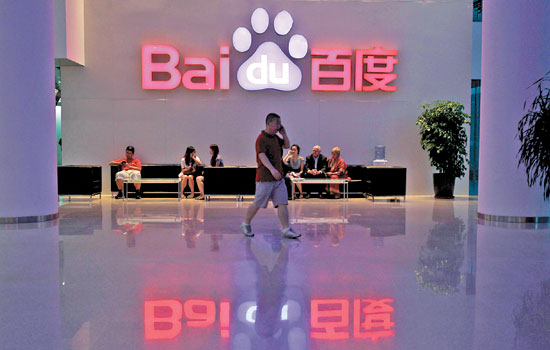
Baidu Inc, China's biggest search engine, will accelerate its pace of investment, including possible mergers and acquisitions, as it hopes to cash in on Internet users' transition from personal computers to mobile devices, said a company official.
|
 |
|
Baidu's headquarters in Beijing. China's biggest search engine said it plans to invest in "key businesses and products" to cash in on Internet users' transition from PCs to mobile devices. [Photo/Agencies] |
Jennifer Li, Baidu's chief financial officer, said on Tuesday that the company will invest in "key businesses and products, key personnel, key partners, and core infrastructure facilities".
"Prudent M&As will continue to complement organic investment, particularly in mobile and cloud technology and vertical content," she said.
The company invested 614.5 million yuan ($98.3 million) in the third quarter in research and development, compared with 382.7 million yuan in the same period of last year.
Baidu's net income grew in the third quarter by 60 percent year-on-year to 3 billion yuan, it said in a statement. Its revenue during the quarter was 6.25 billion yuan, an increase of 49.7 percent over last year, driven by "encouraging customer growth".
Baidu's year-on-year mobile traffic witnessed triple-digit growth, said Robin Li, Baidu's chairman and chief executive officer.
The company will further develop its mobile business by providing advertising products based on mobile Web browsers and mobile applications, and developing location-based services, he added.
Jennifer Li said that the macro economy "isn't that healthy", but the company can cash in on mobile traffic, which is "growing very fast".
Baidu forecast that its revenue will range from 6.16 billion yuan to 6.35 billion yuan in the fourth quarter, lower than a 6.41 billion yuan average of 13 analysts' estimates compiled by Bloomberg.
China's online advertising market has been hit by the nation's slowing economic growth, which has led to a reduction in major Internet companies' advertising revenue this year.
In the third quarter, Baidu had 78.6 percent of the search market in China, measured by revenue, while Google Inc had 15.4 percent and Sogou.com Inc had 3.2 percent, according to domestic research company Analysys International.
It said that Qihoo 360 Technology Co, a popular Web browser maker in China that released its search engine in August, has taken traffic from Baidu and Google. Qihoo's search traffic was close to 10 percent of the total in the last week of August, but its share is currently down to 7 percent.
However, Nomura Securities wrote in a research note earlier this month that: "We believe investors have been overly concerned about Qihoo's potential threat to Baidu's market position. However, given the monopolistic nature of the search market, we believe Baidu's share could hardly be stolen and Baidu's biggest threat could only be itself due to the base effect."
Google also intends to increase its footprint in the mobile advertising sector with its solutions that enable advertisements to be shown on mobile applications, Web pages, mobile search results and online videos.